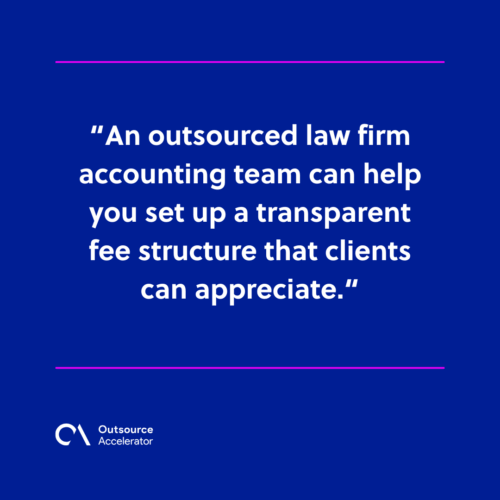Law firm accounting: All you need to know

Law firms earn revenue through client billing—whether by the hour, flat consultation fees, or ongoing retainers. Therefore, managing these transactions accurately is essential. They require proper documentation and must comply with state and federal regulations.
Law firm accounting can be tedious. While some lawyers with a Certified Public Accountant (CPA) designation may opt to keep legal accounting management in-house (i.e., do it themselves), it is often easier and more cost-effective to hire third-party service providers for this job.
This guide will help you become more familiar with outsourcing legal accounting processes and how to do it the right way.
What is law firm accounting?
Law firm accounting, also known as legal accounting, refers to the management of a legal firm’s financial records and transactions.
Some of its core components include:
- Trust accounting
- Time and billing management
- Financial reporting and compliance
- Expense tracking and budgeting
- Tax planning and preparation
Legal accountants handle a law firm’s expenses, bill clients, manage trust accounts, and more—all while remaining compliant to legal regulations.

How does law firm accounting differ from general accounting?
Legal accounting and general accounting both involve managing the transactions and financial records of a company or law firm. However, the two legal practices have some distinctions.
Unlike general accounting, legal accounting is governed by specific guidelines designed to safeguard not just a law firm’s operations but also its clients’ money. These guiding rules are crafted by legal organizations, such as the American Bar Association (ABA).
Law firm accounting requires a more specialized knowledge combining the principles of both the accounting and legal professions. It is also more stringent as legal accountants must adhere to the regulations of the two vocations.
Common mistakes in law firm accounting
When it comes to accounting, even the smallest mistakes can have dire ramifications. Knowing more about the different errors in legal accounting can help you avoid them.
Here are some of the accounting blunders you should beware of:
Borrowing from IOLTA
IOLTA, short for Interest on Lawyers’ Trust Account, refers to the funds pooled from a firm’s clients’ monies (advanced fees, settlement checks, etc.). This interest-generating account is managed by the firm, with the interest used to fund legal aid programs.
Borrowing money from IOLTA is illegal and is a violation of the American Bar Association’s Model Rules of Professional Conduct.
Per the ABA’s code of conduct, lawyers may only use funds from the IOLTA under very specific circumstances.
Mishandling trust accounts
Account management oversights are not uncommon. You can mess up trust accounts in several ways, including:
- Erroneous deposits
- Commingling funds
- Inaccurately reporting accounts
- Accidental misuse of client funds
Consequences depend on the severity of the mistake. They can range from a slap on the wrist to even disbarment.
Data entry mishaps
As stated earlier, even the tiniest errors can have far-reaching consequences when you’re dealing with numbers and other people’s money.
When the omission of a period or the unwitting addition of an additional zero can mean the difference between 100.00, 1000, and 10000, there can be no room for mistakes.
Inconsistent billing practices
Lack of consistency when it comes to client billing can be confusing for your clients. Inconsistent billing does not only mean varying rates for the same services; it also includes failing to clearly communicate services rates with clients.
A disorganized and unclear billing can harm your law firm’s reputation, not to mention eat up your time with handling billing disputes from dissatisfied clients.
Failing to regularly reconcile accounts
Accounts reconciliation should be done regularly. Not doing so can lead to discrepancies, inviting risk of fraud and funds mismanagement.
Why does a law firm need accounting services?
The basic principles of accounting and bookkeeping are no doubt easily understood by lawyers. Especially for CPA lawyers, these tasks may present no challenge at all—knowledge-wise, at least.
The main issue though, is that law firm accounting is a meticulous and often time-consuming process. It eats up precious hours that lawyers could have spent on billable activities, such as drafting legal documents or doing case research.
With an outsourced legal accounting team, law firms can focus on revenue-generating pursuits without worrying about the financial aspect of their business.
Aside from saving time, here are other benefits law offices gain through outsourcing legal accounting:
Assured expertise and compliance
Third-party accounting service providers commonly have a team of experienced CPAs well-versed in legal accounting and the state and federal regulations that apply to it.
These seasoned professionals’ expertise encompasses areas such as:
- Financial strategy
- Tax planning and compliance
- Lease negotiations
- Financial reporting
- Treasury management
Moreover, an outsourced law firm accounting team often has more than just a CPA. It also includes dedicated bookkeepers and controllers.
Improved risk management
Having a team of outsourced accountants and bookkeepers managing your legal accounting can help mitigate issues before they become real problems.
Through constant monitoring and reconciliation of accounts (without distraction from non-accounting activities), an outsourced legal accounting team can spot and address discrepancies early on.
This helps law firms avoid financial mishaps that may land them in hot water.
Better client relationship management
Few things are more annoying to clients than unexpected charges.
An outsourced law firm accounting team can help you set up a transparent fee structure that clients can appreciate. More importantly, they can communicate and clearly explain these fees to your clients should the need arise.

Reduced overhead costs
Outsourcing your legal accounting team instead of keeping one in-house can help you cut back on overhead expenses.
Third-party service providers let you hire legal accountants at significantly lower prices than hiring professionals locally.
On top of that, you’ll also save on associated costs (e.g., benefits, equipment, accounting software subscriptions, etc.) as service providers typically shoulder these.
More focus on core activities
Letting other professionals handle the accounting for your law firm allows you to focus more on the raison d’etre of your legal office: Practicing law.
Without the time-consuming burden of reconciling accounts and painstakingly double-checking costs and expenses, you can devote more time to activities you could bill your clients for.
This lets you focus your energy on your actual field of expertise and generate more revenue for your firm.
How to find a reliable law firm accounting services provider
It goes without saying that choosing which accounting services provider to partner with is paramount.
It’s not enough to simply find a team of CPAs and bookkeepers. This team must also have a deep knowledge and thorough understanding of the legal profession and relevant state and federal laws.
Below are some tips for finding the perfect law firm accounting services provider for you:
Determine what your firm needs
The first step to outsourcing is knowing what exactly you need to outsource. Determine which processes would be most beneficial to delegate.
Will you outsource your bookkeeping, tax preparation, financial planning, or perhaps your entire accounting process?
There are also other factors to consider, such as:
- Your firm’s size
- Transaction volume
- Specific requirements (e.g., expertise on the requirements of specific states)
Once you’ve decided which legal accounting processes you will outsource, you can begin looking for service providers that offer these.
Check for qualifications
Just as you wouldn’t entrust important cases to amateur lawyers, you shouldn’t hand over your firm’s financial management to unqualified legal accountants.
It’s important to conduct due diligence on each company you’ve short-listed for your consideration. Having accountants with a CPA designation should be the bare minimum.
In addition, look for accounting service providers with specialized training and certifications (e.g., AICPA membership) in legal accounting.
Examine their fee structure
Not all service providers have the same fee structures. Before signing any agreements, make sure you understand your chosen partner’s services and payment setup.
Do they charge an hourly rate, or do you have to pay a flat service fee? Discussing pricing packages beforehand can help you avoid hidden costs and allocate your budget more effectively.
Assess their technology
Accounting technology has come a long way from hefty ledgers and folders thick with receipts and documents.
A competent accounting services provider should have access to commonly used accounting software (e.g., Quickbooks, Xero, and Oracle Netsuite) and other legal software solutions.
Aside from having the digital tools of the trade, a good provider of accounting services must have a robust data security system in place.
Should you outsource your law firm accounting team?
If you don’t have a dedicated in-house accounting department, entrusting your legal office’s finance management to an offshore service provider may be the next best thing.
Not only will you be getting access to highly qualified CPAs equipped with the latest accounting software, you also get to hire them at a fraction of what it costs to hire local accountants!







 Independent
Independent




